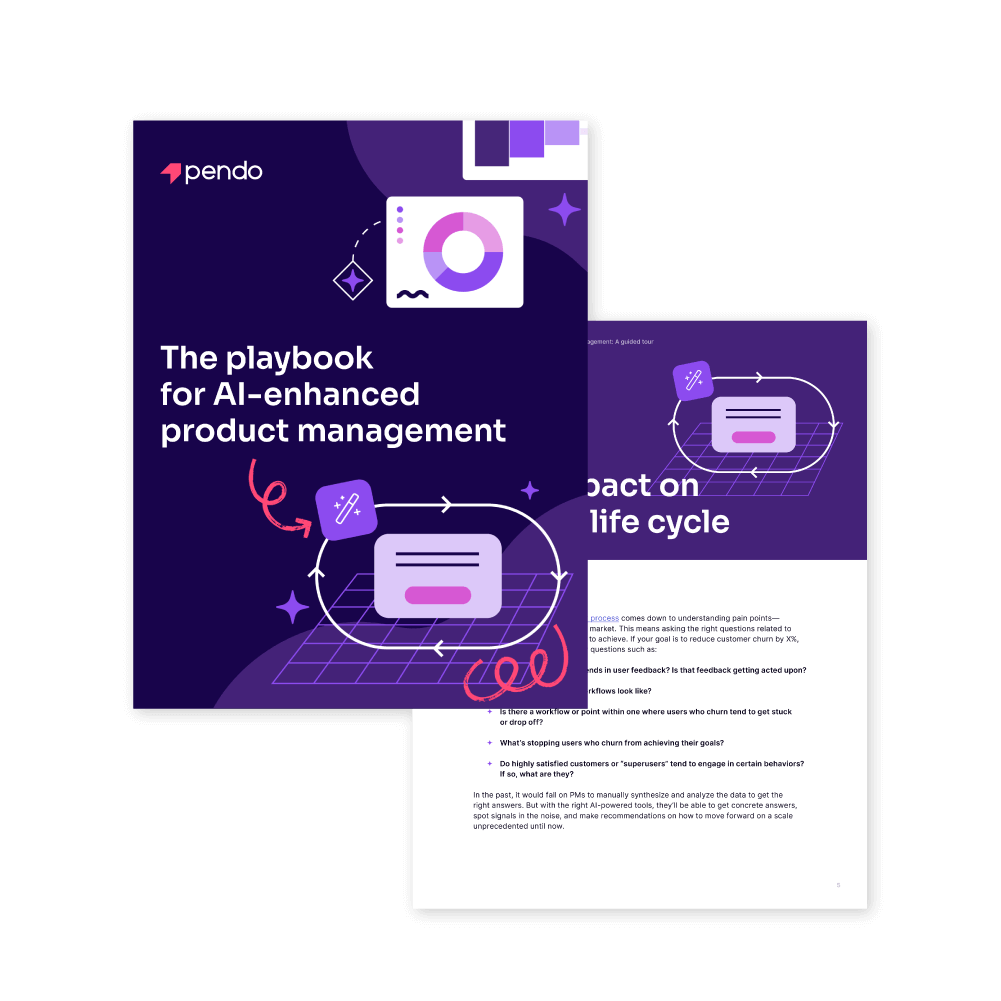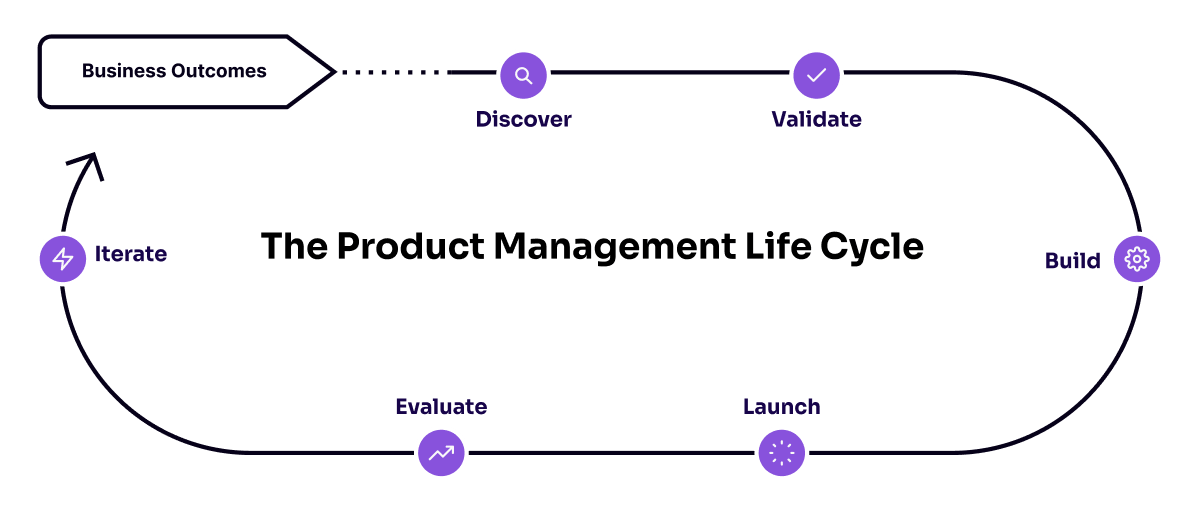
目次
お急ぎですか?
PDFをダウンロードして後で見る
はじめに
ビジネスをより強固なものにすることを目指すクリエイターとして、プロダクトマネージャー(PM)は常に、より多くのことをよりうまく遂行する方法を模索しています。PM向けのプロダクトは毎週のようにリリースされますが、そのどれもが現状を根本から変えられると謳っています。このような状況下では、そのテクノロジーが実際の業務にどれほど役に立つのかとPMが疑いたくなるのも無理はありません。人々の注目を浴びるアプリやツールは毎月のように登場しますが、そのほとんどは結局のところ、誇大広告によって一時的に注目を集めただけに過ぎません。
しかし、ビジネスシーンにAIが爆発的に普及し始めたときは、何かが違っていました。ChatGPTやその他の大規模言語モデル(LLM)プラットフォームのリリースには、空虚な誇大広告のような感覚はなく、説得力がありました。最近のMcKinseyの報告によると、生成AIの幅広い有用性は、ビジネスのさまざまなユースケースに価値を提供できるとされています。マクロな視点からは、生成AIには世界全体で年間2.6〜4.4兆ドルの経済効果があると推定されています。その効果は、ビジネスで活用される機能において、さまざまな方法で実感できるでしょう。特にプロダクトマネージャーは、この革新的なテクノロジーの恩恵を受けられるはずです。
役割の変革
AIがビジネスシーンで旋風を巻き起こす前から、プロダクトマネージャー(PM)の役割は変わりつつありました。かつてはプロダクトのリリースや機能のアップデートに限定された、ニッチでエンジニアリングと隣り合う立ち位置でしたが、今ではビジネスの健全性に不可欠な総合的な職務として発展しました。景気低迷に直面して、ビジネスリーダーは、成長の促進、解約の抑制、コストの削減など、より良い成果を推進するためにPMとPMが使用するツールに注目しています。
「プロダクトマネジメントは進化し続けるスポーツのようになるでしょう。その進化は現在、AIの台頭により新たな段階に突入しました」と、Salesforce Einsteinでプロダクトマネジメントディレクターを務めるMayukh Bhaowal氏は述べています。プロダクトチームは現在、このAIの時代に自らの生活と仕事がどう進化するのか思案しています。ビジネスの世界では、この革新的なテクノロジーの影響が顕在化し始めたばかりです。そしてこれからは、プロダクトマネジメントのすべての過程でこのテクノロジーの影響を受けるようになるでしょう。プロダクト開発のどの段階においても、PMはAIをパートナーとして受け入れ、かつてないレベルでAIを活用していくことになります。
実際にはどのような変革が起こるのでしょうか。このガイドでは、プロダクトマネジメントライフサイクル(望ましい戦略的成果やビジネス成果を創出するためにソフトウェアプロダクトの概念化、開発、リリース、反復を実施するフレームワーク)の視点から、この疑問を考察していきます。AIツールの仕様は日々進化を続けています。私たちは、ますますビジネスクリティカルとなるPM業務において、このようなツールが与える一般的な影響を理解する必要があります。
フェーズ1:発見
For PMs, a successful discovery process comes down to understanding pain points—both of users and of the greater market. This means asking the right questions related to the business outcome you want to achieve. If your goal is to reduce customer churn by X%, for example, you might consider questions such as:
- ユーザーからのフィードバックにはどのような傾向があるか。そのフィードバックには対処しているか。
- ユーザーの一般的なワークフローはどのようになっているか。
- 解約したユーザーには、特定のワークフローやポイントで行き詰まったり離脱したりする傾向があるか。
- 解約したユーザーの目標到達の妨げになっていたのは何か。
- 満足度の高い顧客や「スーパーユーザー」には特定の行動をとる傾向があるか。ある場合、それはどのような行動か。
以前は、PM自身がデータを手動で組み合わせて分析し、これらの問いに対する正しい答えを導き出そうとしていました。しかし、AIを活用した適切なツールがあれば、PMは明確な答えを得られ、ノイズの中から兆候を特定し、かつてない規模で前進するための方法を提案できるようになります。
AIが現状を変える方法
PMは、カスタマーサポートやユーザーへのインタビュー、NPS、フィードバック、営業やサポートへの問い合わせ、プロダクトの使用状況、その他のソースから得たデータをより上手く統合できるようになります。AIツールは、複数のデータソースからパターンを特定することで、PMの貴重な時間を節約します。
The analysis these tools will produce will come with actionable recommendations and evidence to justify the proposed investment(s). This will make the discovery phase exponentially quicker, and the PM coming out of it more confident in their findings.

第2段階:検証
発見の段階で特定された問題点や課題には、有効なソリューションが常に複数存在します。これらのソリューションのうち、「顧客の満足度とビジネスのROIの両方を最大化する」という最高の結果をもたらす可能性が最も高いものはどれでしょうか。ここで、検証の段階が始まります。AIを活用することで、PMはかつてない方法で、自信を持って開発内容を決定できるようになります。
従来の検証段階は時間がかかるうえに扱いにくく、この段階を飛ばしたり、簡単に済ませたりしようとするPMも多く、この点がプロダクトの開発を見誤るリスクになっていました。というのも、過去の検証プロセスには、顧客へのインタビューを手動で設定し、課題に対するソリューションを顧客に提示し、そこからフィードバックや回答を得るという作業が伴っていたからです。最近では、プロダクトの使用状況データ、アプリ内の投票とアンケート調査、サポートチケットによるリクエストなど、PMはさまざまなソースからの検証データも考慮するようになっています。一方で、どのような手段で膨大なデータセットを迅速に分析してアクションを起こせるのかという課題は依然として存在しています。
AIが現状を変える方法
まず、AIを活用したツールでは、さまざまな媒体から獲得した検証データを迅速に分析し、その結果に基づいて推奨事項を提示することができます。そのうえで、AIツールはソリューションやプロダクトのプロトタイプをこれまでよりも迅速かつ簡単に構築していきます。顧客やその他のデータから得たプロンプトをAIツールに提供することで、PMは検証可能なプロトタイプをすばやく生成できます。(たとえば、GPT-4などの大規模言語モデルに、比較的あいまいな説明でより良いコードを作成するよう指示することもできます)。
さらに、AIにより、PMは複数のプロトタイプを同時にテストできるようになるため、チームが適切なソリューションの策定に使える時間が増え、より自信を持ってエンジニアに開発をゆだねられるようになります。
第3段階:開発
Once the time comes to begin building a product or feature, it usually falls on the product manager to help put together and manage the roadmap. Remember, a product manager sits at the intersection of engineering, customer success, marketing, and increasingly finance and sales, so there is no one in a better position to lay out the scope, work required, and end goals in order for all of the above to begin executing.
さまざまな部門から直前になって機能の追加や変更の要求が出され、それらに慌てて対応し、時間を割かれるような事態を避けるため、PMは、進捗状況や発見内容を(たとえばダッシュボードを通じて)より積極的に可視化するよう取り組んでいます。さらに、柔軟なロードマップを活用し、変更内容を迅速に組み込めるようにしています。これにより、ロードマップは特定のプロダクト分野に関する唯一の確かな情報源となります。
AIが現状を変える方法
AIが開発段階にもたらす主な付加価値は、プロダクトテストの実行において実感できます。AIを活用することで、PMはプロダクトテストをロードマップの早い段階に組み込むことができるからです。AIツールは、プロダクトのコードベースをマッピングし、機能の変更がプロダクト全体に与える影響を迅速に提案するため、貴重な時間を節約することができます。この革新により、QAプロセスにかかる時間が大幅に短縮されるため、リリースできるボリュームは増加し、ロードマップを短期間で完了できるようになります。
AIの支援があれば、開発段階に関連する他の作業もスピードアップできます。たとえば、ユーザーストーリー(ユーザー視点からの機能や特徴のわかりやすい説明)や承認基準(特定のタスクを実行するユーザーに承認されるための機能条件)をすべてゼロから作成しなくても、大規模言語モデル(LLM)に短い説明を与えれば、PMの代わりに説明文を生成してくれるため、PMはそれを編集するだけで済みます。
第4段階:リリース
最終的にプロダクトをリリースする準備ができたら、ターゲットとなる顧客や見込み客へのリーチを最大化するために、セールスとマーケティング部門を連携させるのがPMの責務です。一般にプロダクトマネージャーは、プロダクトマーケティングマネージャー(PMM)と協力して、リリースのタイミングや稼働時のプロダクトや機能の位置付けについて、重要なガイダンスを提供します。また、無料機能と有料機能の選定や、コンバージョンとリテンションを最大化することを目的とした特定の機能の有料化の設定などについてもPMが決定します。
プロダクトマネージャーは当然のことながら、自分たちが作ったものをユーザーに知ってもらい、実際に使ってもらおうとするわけですが、現在では多くのPMが、アプリ内ガイドやウォークスルーを活用して、新機能の情報(さらには、その使い方ガイダンス)を最適な場面とタイミングでユーザーに提示しようとしています。これらのガイドと同様、ユーザーを中心として提示を行い、ユーザーの希望やニーズに合わせて公開のタイミングを調整するには、AIツールが役立ちます。
AIが現状を変える方法
ところが、新たなAIテクノロジーの台頭により、PMはリリースのタイミングを手動で決定する必要がなくなるでしょう。その代わり、プロダクトの「スマート」なリリースが行われ、使用状況やユーザーからのフィードバックに基づいて、プロダクト/機能とそれに関連する販促コンテンツの両方が統制の取れた形で展開されます。このデータ主導型のリリースプロセスにより、PMは自動作成されたダッシュボードやレポートを使って目標を監視し、定着率やビジネス成果への影響(収益や解約への影響など)を追跡できるようになります。
またAIを活用すれば、どのようなプロダクトのリリースにも、プロダクト主導の成長(PLG)メカニズムを適用できます。個々のユーザージャーニーにおいてそのユーザーに最も伝えるべき新しいプロダクトや機能とは何かも、AIを活用したツールがあれば特定できます。そのうえで、ユーザーを定着化のための次のステップへと導き、適切なタイミングで適切な有料プロダクトへと確実に移行させるようにします。それが、コンバージョン率の向上やプロダクト主導型の収益増へとつながるわけです。
AIを活用した最も有益な取り組みとは
- プロダクト発見のためのインサイトを迅速に獲得: データの分析、分類、トレンドの特定を行い、自信を持って開発できる顧客インサイトを迅速に獲得します。
- プロダクトに関する意思決定を適切に実施:複数のソースからの大量の検証データを迅速に分析し、かつてないスピードでプロトタイプをテストし、ソリューションへの最適解を見つけます。
- 適切なものをより速く開発:テストとQAプロセスに要する時間を劇的に短縮することで、かつてないペースでプロダクトや機能の実装やリリースを実現します。
- 初日からパーソナライズ:リリース初日から顧客に合わせたサポート内容を自動作成し、適切なタイミングで顧客にプロダクトに関するコンテンツを自動提供します。
- 継続的な成功を促進:うまく機能している点、うまく機能していない点、反復が必要な点を踏まえて自動決定される通知や推奨事項を活用し、顧客のリテンション、エンゲージメント、コンバージョンを促進します。
第5段階:評価
新しいプロダクトや機能のリリースは、「稼動」させて終わるわけではありません。継続的な成功を確実にするために、PMはリリースに際して反響を呼んでいる点、機能している点、機能していない点を評価する必要があります。そのためには、プロダクトの使用状況データを分析し、ユーザーフィードバックを調査し、リリースに関連したサポートチケットの発生有無やチケット発生の背景を確認することが求められます。
ここで、プロダクトの使用状況データと顧客フィードバックの両方に注目することが、ユーザーの行動、どこで行き詰まっているのか、ユーザーがどのような操作を行なっているのか、あるいは何を行っていないのかに関するインサイトを得る鍵となります。同様に、フィードバックとNPSデータを分析すると、PMは発見段階で特定された問題が解決済みであるかどうかを把握できます。
AIが現状を変える方法
AIは、新しいプロダクトについて有効な点と無効な点を自動で判断し、次に実行すべきことをPMに提案します。これにより、評価段階の効率性は飛躍的に向上します。そのためには、上記で獲得したすべての使用状況データおよびフィードバックデータを、人間が支援なしで実施することは不可能な規模とスピードで分析する必要があります。また、AIを活用した適切なツールによりダッシュボードを作成できるため、プロダクトリリース後の状況をモニタリングし、ビジネス上の成果や目標と照らし合わせることもできます。
第6段階:反復
新しいプロダクトや機能のリリースについて評価を実施したら、次にPMが着手するのは、このリリースにより望ましいビジネス成果が生み出されたのかどうかを検討することです。ご存じのとおり、PMは、ユーザーの定着化やエンゲージメント、センチメントというミクロ的な側面だけを追跡しているのではなく、リリースがビジネスとその目標にどの程度貢献しているのかというマクロ的な側面も追跡しています。このような検討の結果、リリースがビジネスに貢献していなかった場合(貢献していた場合でも)、PMはプロダクトの改善サイクルを繰り返し、さらに大きなビジネス成果が得られるよう努めます。つまり、プロダクトマネジメントのライフサイクルが最初から繰り返されるということです。このようにして反復し、優先すべき改善事項を特定していくと、やはり上記のすべての過程でAIが革新的であることが実感できます。
おわりに
PMの役割を奪うのではなく、有用性を高める
The AI revolution in business will accelerate a pre-existing trend in product teams: More and more, the PM of the future will be measured by business outcomes achieved rather than mere features shipped.
AI will accelerate the product management process from discovery to iteration, and make product success increasingly synonymous with business success as a whole. And it will do this not by replacing PMs, but by augmenting their capabilities for analyzing data, forming recommendations, and taking the right actions. “As product managers, our unique blend of strategic thinking, empathy, adaptability, and real-world understanding still sets us apart in this AI-driven landscape,” argues Jing Hu, senior global product manager at Just Eat. This powerful tool will usher in a new chapter in product management, where PMs are freed up to be more creative, build more and better, and see their creations through to a business impact never before possible.
Interested in learning more about AI and product management? Explore AI thought leadership from Pendo and Mind the Product and see even more ways this technology will transform the product space.